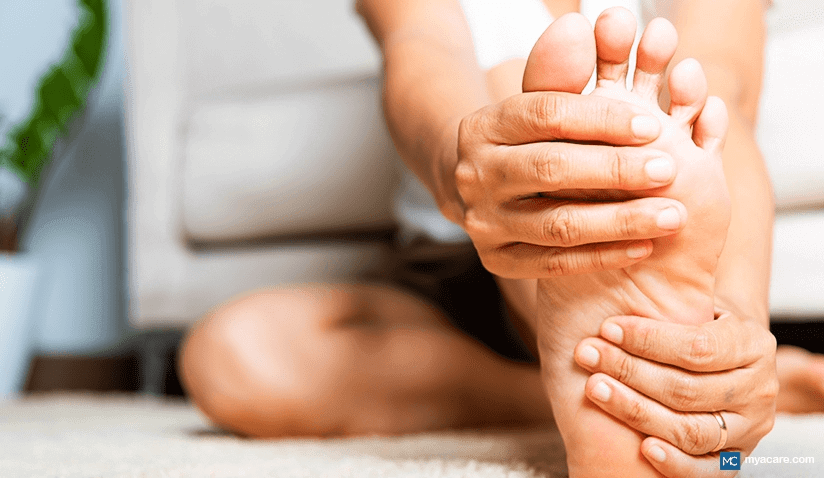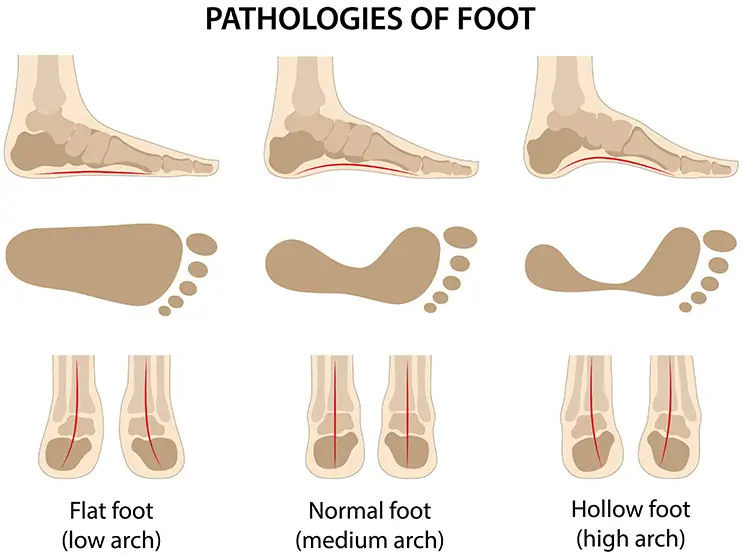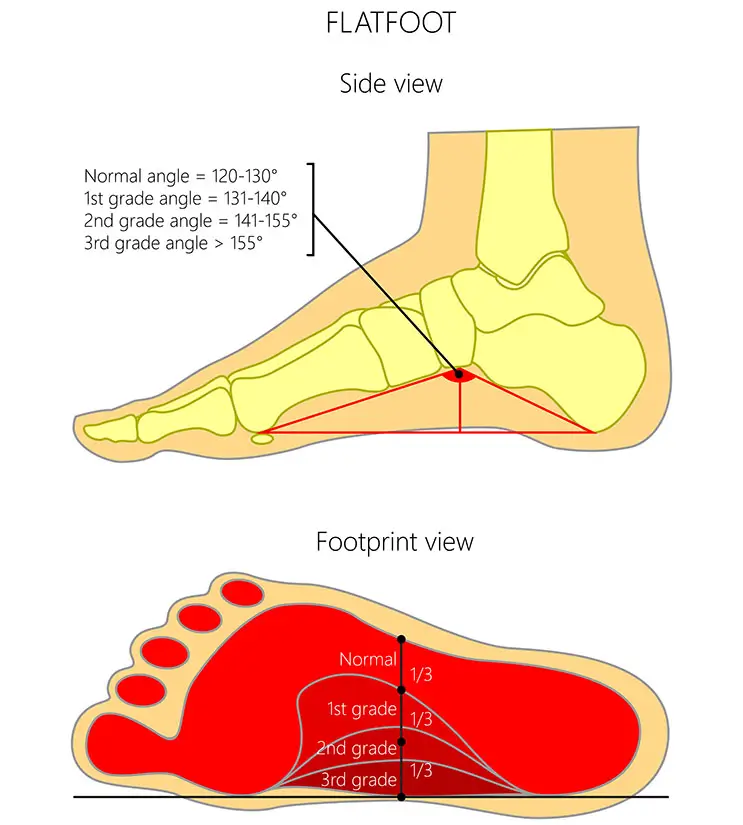Is There a Connection Between Foot Problems and Back Pain, Hip Pain, or Knee Pain?

Did you know your back, hip, or knee pain might be caused by your foot? Studies have revealed that poor foot posture and foot function are the major risk factors for causing lower extremity pain.
While only a qualified podiatrist can provide a full diagnosis of feet problems, in this article, we will address how foot problems can affect your back, hip, and knee and cause pain. Moreover, we will discuss how to treat and prevent these problems naturally.
Our foot is responsible for withstanding the weight of our body when we stand. And we put the entire body force on our feet when we walk.
Hence, if the foot is in poor posture or misaligns, it can affect the back, hip, and knees as they won't have any support to balance their structures.
Poor foot posture can cause misalignment of the bones of your feet which is referred to as a subluxation. This also results in misalignment of the knee joint, causing the knee to twist.
What Foot Problems Affect The Back, Hip, Knee, And How?
All in all, poor foot posture or issues like ankle twisting can affect your back, hip, and knees. Conditions that lead to poor foot posture are described below:
If the posture of your foot is not correct, it can twist inward or outward. The rolling of your foot inward is called low arches, and the rolling of your foot outward is known as high arches. This is also called foot supination (foot leaning outward) and foot pronation (foot leaning inward).

When the arches of the foot move excessively downward or inward, it is called overpronation. And when the foot rolls excessively outward as you lift it off the ground, it is called hyper supination or over supination.
Hence, when your foot rotates inward, it also causes your knee to twist inward, affecting the knee and leading to knee pain.
As a result of the foot twisting in, the hip also drops and rotates inward, causing hip pain.
With time, these mechanical problems lead to various injuries of the foot, ankle, or heels, like plantar fasciitis, and affect your knees, hip, and lower back.
How To Detect Overpronation And Excessive Supination Of Feet?
You might have overpronation or supination If:
- You see your foot rolling excessively inward or outward at times.
- If you see a lot of wear and tear at the edge of your shoes, you might have overpronation. Thus, your back, knee, or hip pain is likely because of overpronation or excessive supination.
- Another sign to detect overpronation or excessive supination is your heels' outer edge will hit the ground first as you walk.
How To Correct Overpronation And Excessive Supination Of Feet?
To correct these conditions, you must fix your foot posture while you walk and take care to use appropriate footwear. For example, people with overpronation should choose footwear that offers extra stability and support.
Orthotics are also an excellent way to relieve the discomfort and pain caused by supination. They are prescription-based medical devices inserted into the shoes to support the foot.
You should choose shoes that have the following properties or features to correct overpronation or supination:
- Shoes that have a dense midsole to uphold the arch.
- To prevent your arch from rolling inward, choose shoes with a wide base of support for the middle part of your foot.
- Prefer shoes with strong heel support and corresponding to your foot size to prevent your foot from moving side to side as you walk.
If you have flat feet, it can also lead to poor foot posture or ankle twisting, causing an imbalance in your back, hip, and knee, resulting in pain.
Flat Feet are a common and painless foot condition. In flat feet, the entire soles of your foot will touch the ground when you stand up. In this condition, the arches inside your feet become flattened.

Flat feet are also called hyperpronated feet because it also causes the feet to roll inward when you walk or run.
Flat feet can cause tendinitis in the Achilles tendon.
How To Correct Or Treat Flat Feet?
- To reduce the symptoms of flat feet, wear over-the-counter arch supports.
- Wear supportive and stable shoes that support your arch.
- If you are overweight, lose weight to reduce the burden on your foot.
- Take over-the-counter pain medications to soothe the pain.
- Avoid physical activities that overburden your feet. Engage in light exercises like walking or biking rather than jumping, running, or weight-bearing tasks until you gain strength.
- Practice some stretching exercises for your feet.
How Do Feet Problems Affect The Hip?
We all know that our hips, knees, and feet are connected to one another. So, the problem in any one body part can directly affect the others too.
The misalignment of the feet bones (subluxation) also causes misalignment of the knee joint. This results in knee and foot imbalances.
Hence, because of the foot and knee imbalances, the lower back and hip also get out of alignment. This causes unnecessary strains and stress on the surrounding tissues, leading to pain.
And as the condition advances, it results in progressive degeneration of the joints.
How To Treat Hip Pain Associated With Foot Problems?
Dealing with hip pain is troublesome, and it may require time to heal, but the condition can be managed naturally by taking care of a few things.
The first thing to do is treat the core problem causing pain, i.e., correct your foot posture. If you correct your foot posture, it will also stop the unnecessary rotation of the hip joint that is leading to pain and inflammation.
If you don't address the underlying cause of pain and go for other things, your pain relief might be for the short term and may reappear. Hence, to treat hip, back, and knee pain, make sure to:
- Correct your foot posture.
- Walk straight and adequately.
- Choose appropriate footwear.
- Make sure your footwear is not worn out.
Conclusion
Our feet are the foundation of our whole body, responsible for carrying our weight and balancing the body.
So, if the feet go out of balance, it can directly affect the knee. And when the knees start to function poorly, their impact can go up to the hip, and the hip imbalance can affect the lower back.
To prevent the foot from affecting other body parts, it is crucial to walk correctly and choose appropriate footwear. If you are experiencing hip, knee, or back pain and have flat feet or you overpronate, there is a major possibility that all the issues might be interrelated. Hence, treating the underlying cause is the most effective way to get rid of the pain and manage the condition.
To search for the best Cardiology healthcare providers in Croatia, Germany, India, Malaysia, Poland, Singapore, Spain, Thailand, Turkey, the UAE, the UK and The USA, please use the Mya Care Search engine
To search for the best Orthopedics Healthcare Providers in Croatia, Germany, India, Malaysia, Singapore, Spain, Thailand, Turkey, Ukraine, the UAE, UK and the USA, please use the Mya Care search engine.
To search for the best healthcare providers worldwide, please use the Mya Care search engine.
Dr. Fatima Munir is a Doctor by profession, a freelance content writer, and a researcher. With a penchant for research, she diligently curates facts and the latest literature to guide readers on all matters of health.
References:
Featured Blogs



